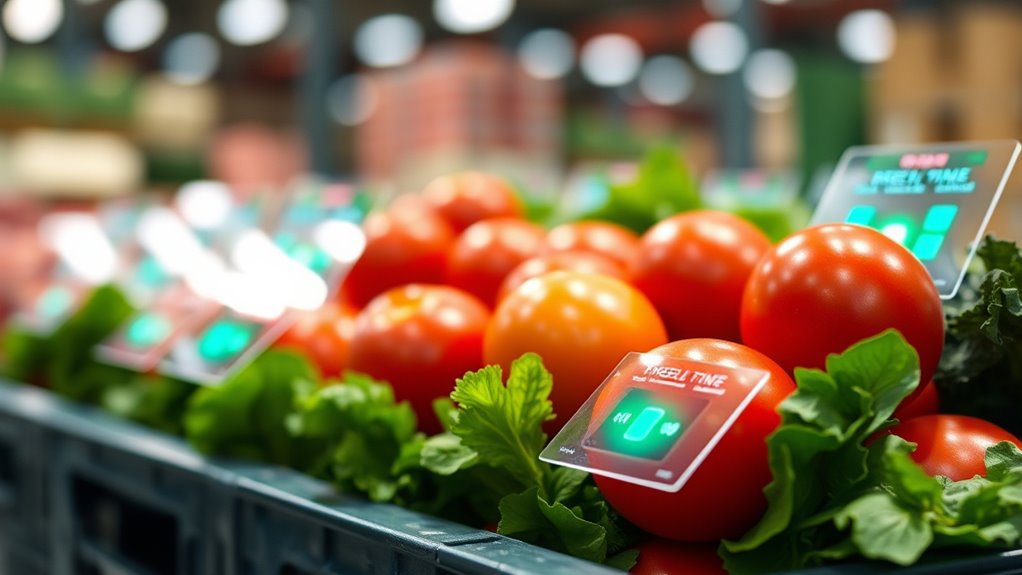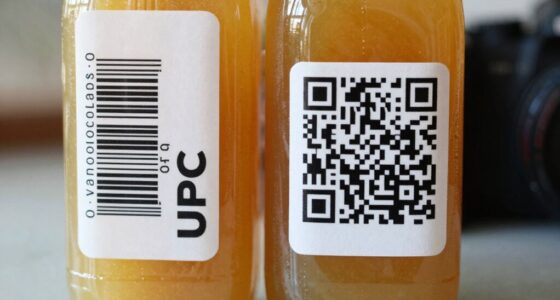Smart labels enable you to monitor product freshness during transit in real-time, increasing transparency and building trust with consumers. Using biosensors and RFID technology, these labels track conditions like temperature and spoilage indicators, allowing you to quickly identify issues and guarantee quality. They also help optimize inventory management, reduce waste, and demonstrate regulatory compliance. Exploring further reveals how smart labels can revolutionize your supply chain with innovative, future-ready tracking solutions that keep products fresh and customers satisfied.
Key Takeaways
- Smart labels incorporate biosensors and RFID to monitor temperature, humidity, and spoilage indicators during transit.
- Real-time freshness data enables quick response to quality issues, reducing waste and recalls.
- Transparent tracking builds consumer trust by verifying product freshness and authenticity throughout the supply chain.
- Integration of advanced IoT technologies supports accurate, continuous updates on product condition during transit.
- User-centered label designs with natural and health-focused messaging enhance consumer satisfaction and confidence.
How Smart Labels Enhance Supply Chain Transparency
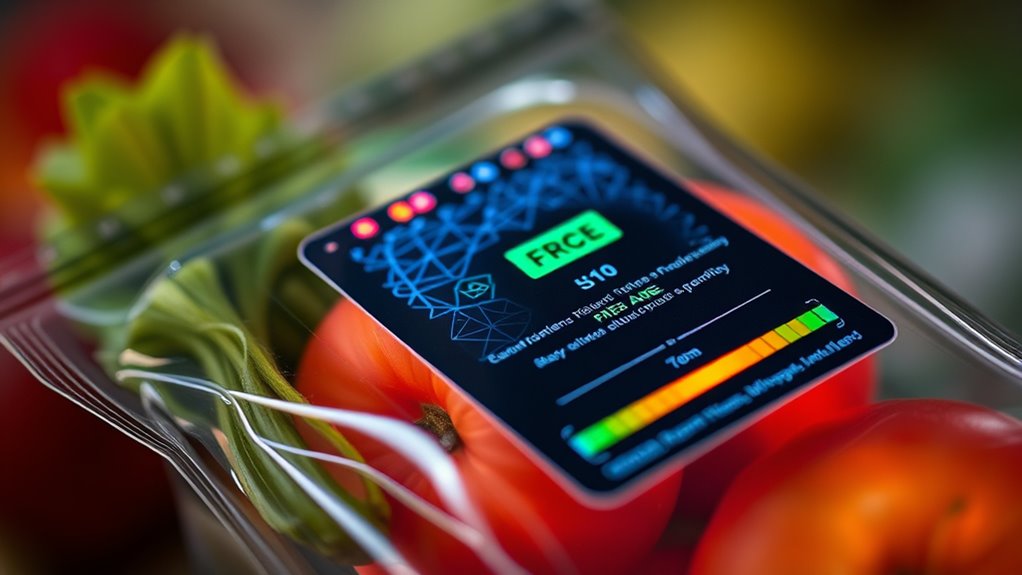
Smart labels considerably improve supply chain transparency by providing real-time data that track a product’s journey from origin to destination. This transparency helps build consumer trust because you can verify the freshness and authenticity of your products at every stage. When companies use smart labels, they demonstrate a commitment to regulatory compliance by accurately monitoring and documenting handling conditions, such as temperature and storage requirements. This reduces the risk of violations and ensures products meet safety standards. As a result, you gain confidence in the quality and safety of what you purchase. Smart labels also enable quick response to issues, minimizing waste and recalls. Incorporating quality assurance measures through smart labels further enhances overall product integrity. Additionally, these labels can facilitate real-time tracking, allowing for immediate intervention if problems arise. Smart labels can also help reduce product spoilage by providing continuous monitoring of environmental conditions during transit. This ongoing data collection supports supply chain optimization, leading to more efficient logistics and inventory management. Furthermore, the integration of environmental data enhances the ability to predict and prevent potential disruptions, making the entire supply chain more resilient. Overall, they create a more transparent supply chain, fostering trust and meeting regulatory demands effectively.
Key Technologies Behind Smart Labels for Freshness Monitoring
The effectiveness of smart labels in monitoring freshness relies on a combination of advanced technologies that detect and communicate product conditions in real time. Biosensor integration plays a vital role, enabling labels to measure parameters like temperature, humidity, and spoilage indicators directly. These sensors provide accurate, timely data about the product’s condition. Data privacy concerns are also relevant, as sensitive information related to product conditions must be securely transmitted and stored. RFID advancements complement this process by offering reliable wireless communication, allowing labels to transmit data seamlessly to scanning devices or centralized systems. Together, biosensor integration and RFID technology create a robust monitoring system that guarantees freshness is maintained throughout transit. This synergy allows for precise tracking of product quality, reduces waste, and enhances transparency across the supply chain. Durable construction and other design features also contribute to the reliability and longevity of smart labels in various shipping environments. Additionally, the development of sensor durability ensures that these labels can withstand harsh conditions, maintaining their accuracy and functionality over time. These key technologies form the backbone of effective freshness monitoring in modern logistics.
Benefits of Real-Time Data for Producers and Distributors
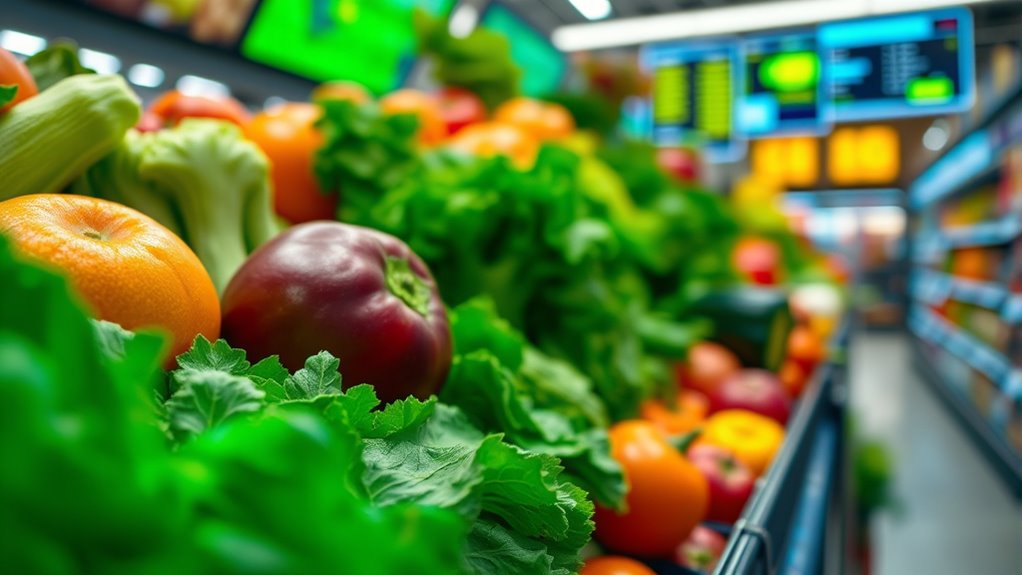
Real-time data from smart labels empowers you to make immediate, informed decisions about product quality and safety. By continuously monitoring conditions like temperature and humidity, you can quickly identify issues that could compromise freshness. This proactive approach helps maintain consumer trust, as your customers see your commitment to transparency and quality. Additionally, access to real-time information guarantees you stay compliant with regulations, avoiding fines and recalls. You can respond swiftly to potential problems, reducing waste and improving inventory management. Smart labels also provide documentation for regulatory audits, demonstrating your adherence to safety standards. Overall, real-time data enhances your ability to deliver fresh, safe products, strengthening your reputation and ensuring smoother operations from production to delivery.
Implementing Smart Labels: Challenges and Solutions
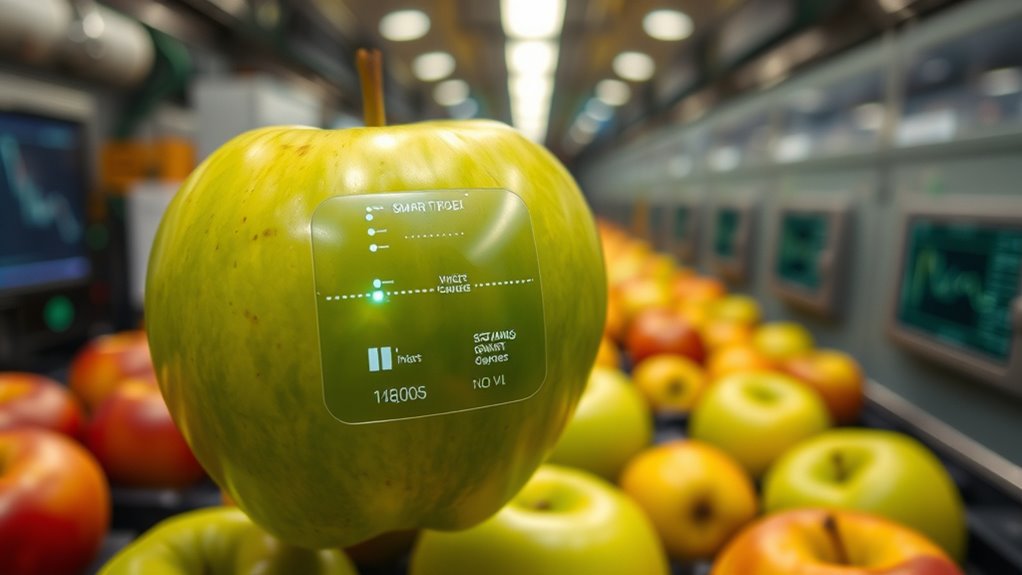
Implementing smart labels presents several challenges that you need to guarantee a smooth integration into your supply chain. One major concern is the cost implications, which include investing in new technology and training staff. You’ll also face regulatory hurdles, as compliance with safety and labeling standards varies across regions. To address these challenges, consider:
- Conducting a thorough cost-benefit analysis to assess long-term savings
- Staying updated on evolving regulations to ensure compliance
- Partnering with experienced technology providers for seamless integration
- Evaluating the impact of color accuracy and contrast ratios on the effectiveness of the smart labels and related display technologies
- Additionally, understanding risk assessment strategies can help you identify potential vulnerabilities early in the implementation process. Incorporating smart technology trends can also guide you in selecting the most effective solutions for your needs. Being aware of data security measures is crucial to protect sensitive information transmitted by smart labels and prevent potential breaches. Furthermore, considering compatibility with existing systems ensures that new smart labels will integrate smoothly with your current infrastructure.
Balancing these factors helps minimize disruptions and maximizes the benefits of real-time freshness tracking. By proactively tackling these challenges, you’ll streamline your implementation process and improve overall supply chain efficiency.
Future Trends in Freshness Tracking and Smart Label Innovation
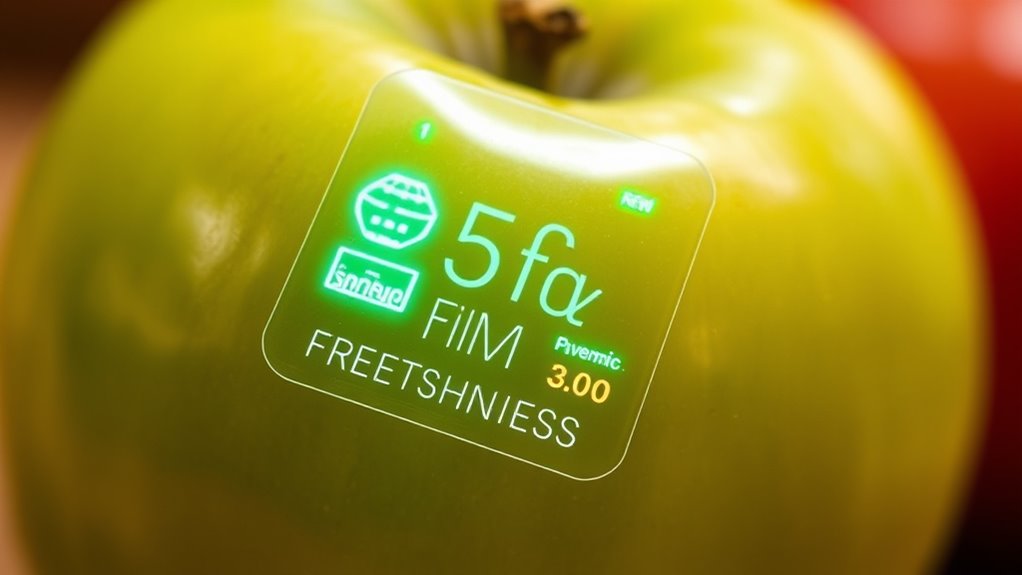
Advancements in smart label technology are opening new possibilities for enhancing freshness tracking and supply chain transparency. Future trends focus on integrating more sophisticated sensors and IoT connectivity, allowing real-time updates that boost consumer engagement. As these innovations develop, data privacy becomes a critical concern; manufacturers must guarantee secure data handling to maintain consumer trust. Enhanced transparency not only improves freshness management but also empowers consumers with detailed product information. Smart labels may soon include personalized notifications about freshness, storage tips, or origin details, fostering stronger engagement. As these trends evolve, balancing innovation with robust data privacy measures will be essential to maximize consumer confidence and drive widespread adoption of smarter, more transparent freshness tracking solutions. Incorporating data privacy considerations into design and implementation will be vital for long-term success. Additionally, understanding how prophetic dreams have historically influenced decision-making can inspire trust and ethical responsibility in deploying these advanced tracking systems. Furthermore, integrating aesthetic design into smart labels can enhance consumer appeal and acceptance of these new technologies. Incorporating consumer preferences into label design can lead to higher user satisfaction and trust. Moreover, leveraging vegetable juice insights about natural health benefits can help tailor product information to consumer interests, encouraging healthier choices.
Frequently Asked Questions
How Do Smart Labels Affect Overall Product Pricing?
You might wonder how smart labels influence product pricing. They can increase cost implications due to the technology involved, but they also enable better tracking and freshness management. This can lead to more effective pricing strategies, as you can justify higher prices for fresher products or reduce waste costs. Overall, smart labels might raise initial costs, but they can also help you optimize pricing and improve profitability over time.
Are Smart Labels Environmentally Sustainable?
You’re wondering if smart labels are environmentally sustainable. These labels can be eco-friendly if manufacturers choose biodegradable options and eco-friendly materials. When you select products with smart labels made from sustainable materials, you help reduce waste and minimize environmental impact. By supporting brands that prioritize biodegradable options, you contribute to a greener future while still benefiting from the convenience and freshness tracking smart labels offer.
What Types of Products Benefit Most From Smart Label Technology?
Imagine a guardian angel watching over your products, safeguarding their freshness. You’ll find that perishable items like fresh produce, dairy, and meats benefit most from smart label technology. These labels act as vigilant sentinels, providing real-time temperature monitoring to prevent spoilage and guarantee quality. By catching potential issues early, you reduce waste and protect consumers, making smart labels essential for items where freshness is critical and spoilage prevention is a top priority.
How Secure Is the Data Transmitted by Smart Labels?
You might wonder how secure the data transmitted by smart labels is. Rest assured, they use advanced encryption protocols to protect your information, ensuring it’s safe from unauthorized access. These protocols bolster data privacy, making sure sensitive details stay confidential during transit. While no system is entirely foolproof, smart labels are designed with security in mind, giving you peace of mind that your data remains protected throughout the tracking process.
Can Consumers Access Freshness Data Directly From Smart Labels?
You can access freshness data directly from smart labels, enhancing consumer transparency. These labels are designed with label accessibility in mind, allowing you to scan or interact with them easily using your smartphone or other devices. This immediate access helps you make informed choices about freshness and quality, giving you greater control and confidence in your purchases. Smart labels bridge the gap between producers and consumers, promoting transparency and trust.
Conclusion
As smart labels revolutionize freshness tracking, you become the captain steering your supply chain through smooth, transparent waters. With real-time data guiding your decisions, you’ll catch issues before they surface, saving time and reducing waste. Embrace these innovations now, and watch your products stay fresher longer—turning your logistics into a well-oiled machine. The future of supply chain transparency is within your reach—don’t let it slip away like sand through your fingers.
Susannah expertise lies in researching and compiling evidence-based content on juicing, nutrition, and overall health. She is committed to ensuring that The Juicery World offers accurate, up-to-date, and trustworthy information to empower readers to take control of their health. Susannah’s goal is to inspire individuals to embrace juicing as a way to nourish their bodies and live their best lives.

